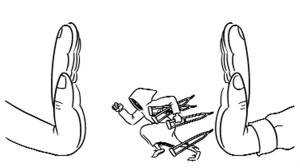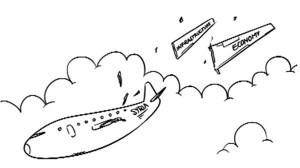
Justice served

Sir,
The people of Pakistan will not forget outgoing Chief Justice of Pakistan Justice, Jawwad S. Khawaja. During his brief 23 days in office as head of the Supreme Court, he has tried his best to remind the judiciary that its primary task was to provide justice to the people of Pakistan by upholding the Constitution, which he termed ‘a living document’. It is for individuals and institutions of state to conform to their designated and defined roles in the Constitution.
How unfortunate that the lawyers’ movement for the restoration of the judiciary was eventually hijacked by a few members of the bar who wanted their pound of flesh – to the dismay of civil society members who had supported the original movement in hopes that it would lead to a cleaner, better structured judiciary. What we have seen instead is the creation of cartels by high-profile lawyers seeking hefty financial remuneration, which, in most cases, only those involved in crime, land grabbing and institutionalized corruption can afford. As if this were not enough, young lawyers resorting to violence and harassing judges and members of the public has become a common occurrence.
All this makes it even more commendable that Justice Jawwad Khawaja and other honourable SC judges tried to stop institutionalized malpractice and ended up annoying several ‘powerful’ lawyers.
Malik Tariq Ali,
Lahore.
A new hope

Sir,
Jeremy Corbyn has been elected the new leader of Great Britain’s Labour Party. By electing a man with leftist leanings, Labour seems ready to take the party back to its roots, something that was deemed impractical under Tony Blair. The old guard of the Labour party always termed Blair’s decision a betrayal and never really bought what the former Prime Minister was trying to sell under the label of pragmatism and realpolitik.
To what extent socialist leanings are still relevant and how successful Corbyn will prove in reinvigorating a demoralised political party (having lost two consecutive general elections to the Conservatives) has yet to be seen. That said, the fact that the underdog has been elevated to head of the Labour Party provides a glimmer of hope to those familiar with British politics.
Having seen the Liberal Democrats lose their relevance and having been disillusioned by Blair’s Labour Party, I have developed a strong liking for Cameron’s Conservative Party – even though I count myself a liberal. However, it would be best if Corbyn reinvigorated Labour, as this would be in the best interest of a united Great Britain. Traditionally, Labour has had stronger roots in Scotland than the Conservatives, and a revitalised Labour Party, one that might reclaim its clout and signature appeal, could help avert the possible departure of Scotland from the federation.
Tassawur Bosal,
Mandi Bahauddin.
Moment of truth
Sir,
The Pakistan Cricket Board (PCB) has officially signed former captains Wasim Akram and Ramiz Raja as ambassadors for the Pakistan T20 Super League (PSL). Only a few days ago, Raja wrote an article on a prominent cricket website in which he stated that Pakistan should not welcome back Mohammad Amir onto the team because he had been guilty of cheating.
I hope Raja will now resign from the role of ambassador, as Wasim Akram is there by his side. Akram was a suspect in the 2000 Justice Qayyum report. Personally, I am indifferent as to whether Amir should be allowed back onto the team, but whatever decision the PCB makes should also be applied to all others involved in match/spot fixing. Raja should now walk the walk. Otherwise, he really needs to stop talking the talk when it comes to cheating in cricket.
Mubashir Mahmood,
Karachi.
Roll up, roll up

Sir,
In Western countries, where cigarettes cost far more, smokers often prefer to buy their rolling paper and tobacco separately, and then make their own cigarettes to save money. The sale of Rizla rolling paper abroad is somewhat justifiable, not diminishing the fact that smoking tobacco remains as harmful as ever.
In Pakistan, we now have millions of small shops selling cigarettes and thousands of lavish branded tobacco outlets, the latter more often seen in metropolitan cities. We already know that cigarettes are reasonably priced in this country, regardless of which Rizlas account for significant sales. So why is rolling paper still being sold in large volumes when the price of an ordinary cigarette is quite reasonable?
Many young Pakistanis purchase Rizlas not just to fill with tobacco, but also marijuana and other drugs. You can conveniently enter any tobacco outlet and easily buy Rizlas, with the additional option of different brands and flavours. Not only this, but you can also legally buy paper rolling machines and other accessories needed to roll a joint. This is alarming. The government needs to take serious notice of the sale of Rizlas. Such products should not be so easy to purchase for the average consumer. The authorities should take notice of this issue and immediately impose a complete ban on the sale of rolling paper as part of their fight against drug use in the country.
Farooq Azhar Khwaja,
Lahore.
End polio

Sir,
Polio now separates Pakistan from the rest of the world. A warning by the chairman of the Independent Monitoring Board, published in sections of the press, has asked the Pakistani government to take transformative action to fix the country’s appalling polio programme. The question now is: how and when Pakistan will overcome polio? Our PM seems to be taking the situation seriously: he has now called emergency meetings and discussed the issue with the chief ministers of all four provinces. The world managed to eradicate polio through community participation and ownership of the issue. Our government and non-government initiatives have largely failed in this instance because society at large does not take ownership of anti-polio efforts.
Recent research by Ellen A Coates, Silvio Waisbord, Jitendra Awale, Roma Solomon and Rina Dey in Global Health Science and Practice looks at how, in response to low routine immunization coverage and the ongoing polio virus circulation, US-based CORE group members and local non-government organisations partnered with UNICEF in India to create the Social Mobilization Network (SMNet) – a network that has played a pivotal role in stopping the transmission of polio in India. It also looks at how important this network remains as India struggles to remain polio-free in a world where the virus continues to circulate and 27 million Indian children are born each year.
SMNet’s goal was to improve access to and reduce family and community resistance to vaccinations. The partners trained thousands of mobilisers from high-risk communities to visit households, promote government-run child immunization services, track children’s immunization history, encourage the vaccination of children who had missed their scheduled vaccinations and mobilise local opinion leaders. Creative behaviour-change activities and materials promoted vaccination awareness and safety, household hygiene, sanitation, home diarrheal disease control and breastfeeding. The use of routine project data and targeted research findings offered insights into and informed innovative approaches to overcoming community concerns impacting immunization coverage.
With this in mind, health departments and district administrations in Pakistan must engage community-based organisations at the union council level before the start of each polio campaign. District administrations could set up a “Polio Eradication Network” at the union council level, which would ensure the proper participation of all communities in polio vaccination campaigns. There are many lessons to be learned from the aforementioned research. Pakistan cannot afford to become even more isolated from the rest of the world – and that too in diseases that the rest of the world has now overcome. The time to act is now and the way forward isn’t all that hard to figure out.
Aijaz Ali Khuwaja,
Karachi.
Friends and neighbours

Sir,
The Central Asian Republics (CARs) have vast resources. Kazakhstan, Turkmenistan and Uzbekistan export oil and natural gas as well as liquefied natural gas. The Kyrgyz Republic and Tajikistan have major hydropower resources that can be channelized to market electricity to Afghanistan, China, Iran, Pakistan, and Russia. Kazakhstan is a prominent world leader in coal production. Kazakhstan and Uzbekistan have uranium reserves. Central Asia is also located such that it commands considerable geopolitical and economic importance.
Pakistan’s geographical proximity to the Central Asian region can provide benefits for both sides. In the early 1990s, some attempts were made by the Pakistan Foreign Office to engage the CARs for trade and economic cooperation, but all diplomatic efforts went to waste after 9/11. Now, the inevitable drawdown of ISAF military forces in Afghanistan has opened up new opportunities for Pakistan and the CARs to explore avenues for cooperation.
Prime Minister Nawaz Sharif’s visits to Turkmenistan and the Kyrgyz Republic in May, and to Kazakhstan in August, are signs of Islamabad’s efforts to strengthen political and economic linkages with the region. On the economic front, TAPI and CASA-1000 are important projects for both Pakistan and the Central Asian states. TAPI’s long 1,735 km pipeline will annually carry 27 billion cubic meters of gas to Afghanistan, Pakistan and India, from Turkmenistan and Tajikistan, respectively, with the potential to increase the capacity to 33 billion cubic meters. The pipeline project has an estimated cost of $10 billion.
The CASA-1000 project also provides a landmark cooperation opportunity between Kyrgyzstan, Tajikistan, Afghanistan and Pakistan. The plan envisages the export of a total of 1,300 MW of excess electricity available during the summers from Tajikistan and Kyrgyzstan – 1,000 MW for Pakistan and 300 MW for Afghanistan. Other projects include road links: the Gwadar–Termez motorway will connect Gwadar to Central Asia, as Termez lies between Uzbekistan, Afghanistan, Turkmenistan and Tajikistan. The route from Termez to Mazaar-e-Sharif will go onto Kandahar in Afghanistan and then to Chaman. The motorway from Peshawar to Torkham, which will go onto Jalalabad, is also under construction and will soon be completed.
All these transportation links will boost trade links between Pakistan and the CARs. Such links will be integral in overcoming the country’s energy deficit. However, these mega-projects will materialise only if the internal security situation in Afghanistan stabilises and peace prevails in the region.
Huma Rehman,
Islamabad.
A dying nation

Sir,
More than four years after it began, the full-blown civil war being fought in Syria has killed over 250,000 people, half of them civilians. The UN estimates that nearly 8 million Syrians have been displaced as a result of the conflict. Taking into account the additional 4 million Syrians who have fled into neighbouring countries, it’s safe to say that more than half the country’s pre-war population of 23 million are victims of a humanitarian disaster, the likes of which we have seldom seen. In addition to inflicting a very high toll on civilians, the Syrian conflict has devastated every foundation on which a country stands, be that its population, civil society, infrastructure, cultural heritage or economy. Prior to the conflict, Syria was a middle-income country with an economy based on agriculture, industry, oil, trade and tourism, and it had decent healthcare and education. Four years on, it’s all changed.
The country’s economy has lost nearly 80% of its productive capacity since the beginning of the civil war. Even if the conflict ceased today, and the country’s GDP grew at an average rate of five percent each year, it will take the Syrian economy an estimated 30 years to regain its pre-war economic strength. The Syrian economy has experienced massive de-industrialisation, dilapidation and degradation as a result of businesses closing down, flight of capital, and general looting and destruction.
While the country was eastern Mediterranean’s leading oil and natural gas producer at one time, Syria has seen its production fall to a fraction of past levels. The country is no longer able to export oil, and as a result, government revenues from the energy sector have fallen significantly. Separately, agricultural activity continues at a reduced level, increasing the reliance on imported items. The continuously depreciating national currency means that the US dollar is highly sought after, with some traders and businesses refusing to accept Syrian pounds. Another alarming figure reveals that 48.8 percent of the workforce is unemployed. Resultantly, more than half of the Syrian population is living in poverty, with some 4.4 million (or more than a fifth of the population) living in abject poverty.
Another victim of the raging conflict is the country’s infrastructure. The World Health Organization estimates that 37 percent of Syrian hospitals have been destroyed, and a further 20 percent severely damaged during the civil war. Civilians are forced to seek help from primitive field hospitals, often run out of homes by local volunteers who have only the most basic medicines and training.
Meanwhile, numerous historical archaeological sites in the country are being systematically targeted and destroyed by the Islamic State. Museums in Syria are also in danger, with there being various incidents of valuable cultural property being looted. A large number of museums have also been damaged as a result of bombing campaigns being conducted by the Syrian army against rebel forces. Syrian cultural property has almost completely vanished, curiously either showing up for sale on the black market and/or being added to private collections. The ongoing uncontrolled violence has led to a broad disintegration of Syrian society, as we knew it. Things have visibly changed and there are qualitative variables that have left deep scars in the conscience of the people. A once vibrant and peace-loving society has now been left full of hatred, with an inherent distrust of other ethnic groups.
Time will tell who wins or loses as a result of this conflict, but one thing is certain, Syria as a country has already lost the struggle for its survival. Who’s to say whether future generations will get to see the Syria of old, or whether they’ll know about Syria through stories alone.
Manish Rai,
Tehran, Iran.

